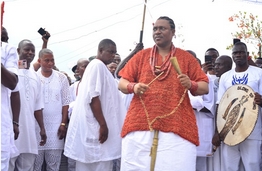
support@yorubalibrary.com
+2348073529208, 07038599574

Yoruba festivals are essential part of Yoruba culture, celebrating various aspects of life, history, and spirituality. Among these festivals, the Igogo Festival stands out for its rich traditions and cultural significance. This article explores the history, rituals, and importance of the Igogo Festival in Yoruba society.
History of the Igogo Festival
The Igogo Festival has ancient roots, originating from the town of Owo in Ondo State, Nigeria.
1. Origins: The festival dates back to the 14th century and is linked to the legendary Queen Oronsen, who was the wife of a former king of Owo. According to tradition, the festival was established to honor her and ensure the fertility of the land.
2. Cultural Heritage: Over the centuries, the Igogo Festival has become an integral part of Owo's cultural heritage, celebrated with great enthusiasm by the community.
Rituals and Traditions
The Igogo Festival features a series of elaborate rituals and traditions that highlight the cultural richness of the Yoruba people.
1. Costumes and Attire: Participants wear traditional attire, including special headgear and clothing made from woven fabrics. The king and chiefs often wear beaded crowns and royal regalia.
2. Drumming and Dancing: Music is a central element of the festival, with drumming, singing, and dancing creating a lively atmosphere. Traditional songs and dances are performed to honor the gods and ancestors.
3. Processions and Parades: The festival includes grand processions through the town, with participants carrying symbols of fertility and prosperity. These parades are often led by the king and his entourage.
4. Ritual Offerings: Offerings of food, kola nuts, and palm wine are made to the gods and ancestors to seek blessings and protection for the community.
Significance of the Igogo Festival
The Igogo Festival holds deep cultural and spiritual significance for the Yoruba people, particularly those in Owo.
1. Honoring Ancestors: The festival is a time to honor and remember the ancestors, particularly Queen Oronsen, whose legacy is celebrated through various rituals.
2. Fertility and Prosperity: The rituals performed during the festival are believed to ensure the fertility of the land and the prosperity of the community. It is a time to pray for bountiful harvests and general well-being.
3. Community Unity: The Igogo Festival fosters a sense of unity and togetherness among the people of Owo. It is an occasion for communal participation and collective celebration.
4. Cultural Preservation: The festival helps preserve and transmit Yoruba cultural practices and traditions to younger generations, ensuring the continuity of the community's heritage.
Modern Adaptations
While the Igogo Festival remains rooted in tradition, it has also adapted to contemporary times.
1. Tourism: The festival attracts tourists from across Nigeria and beyond, contributing to the local economy and promoting cultural exchange.
2. Media Coverage: Increased media coverage has brought wider recognition to the Igogo Festival, showcasing Yoruba culture to a global audience.
3. Community Development: Proceeds from the festival are often used to fund community projects and development initiatives, benefiting the people of Owo.
Conclusion
The Igogo Festival is a vital aspect of Yoruba cultural heritage, reflecting the values, history, and spiritual beliefs of the Yoruba people. Its continued celebration not only honors the past but also strengthens community bonds and promotes cultural pride. As the festival evolves, it remains a powerful symbol of Yoruba identity and tradition.

Learn about the Yoruba concept of Ìwà Pẹ̀lẹ́ (good…

Learn special praises for Divine Being and Creator…